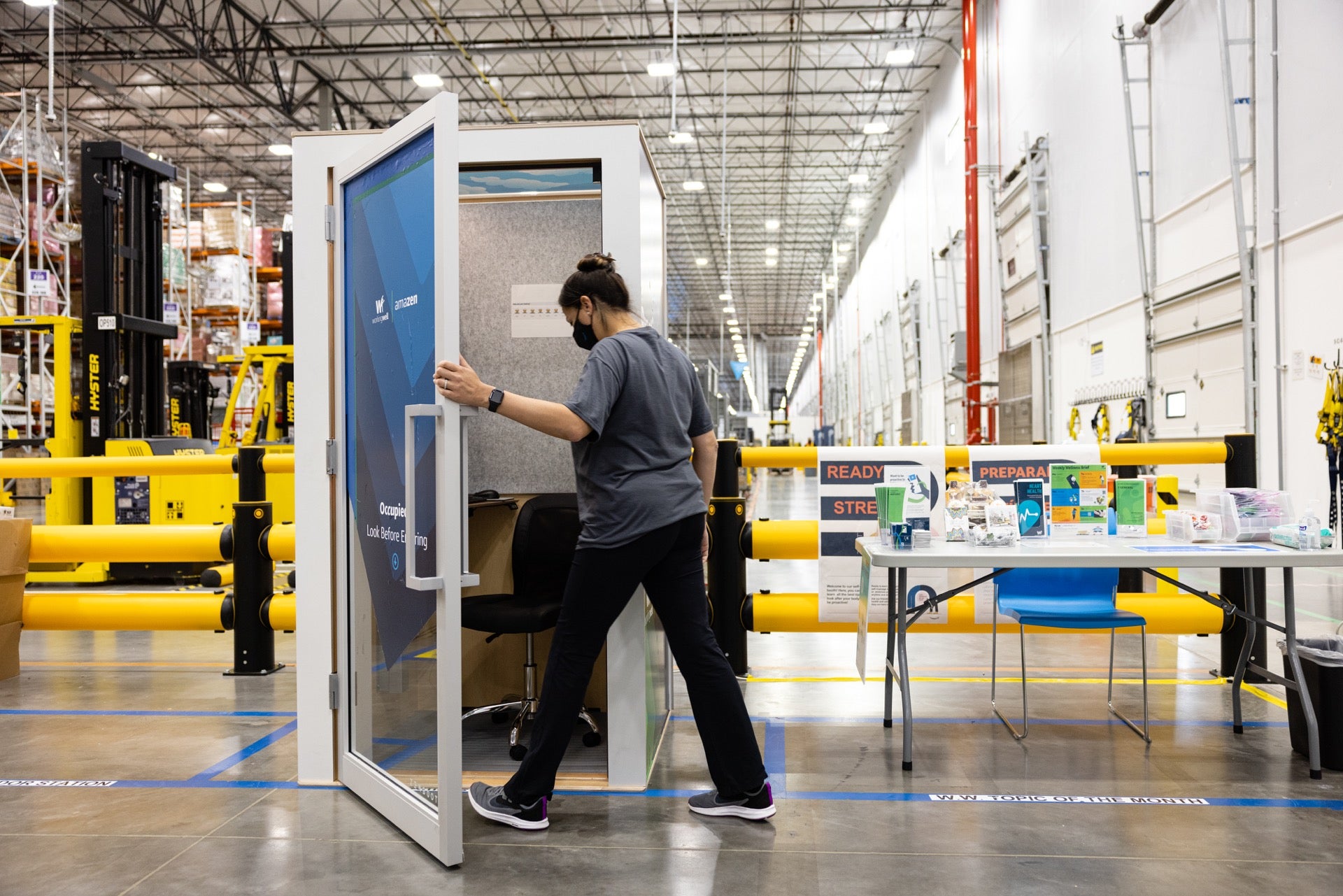
Amazon has deleted a video about its new AmaZen wellbeing booths after both post and concept received an online pelting by the Twitterati.
The so-called “ZenBooth” or “Mindful Practice Room” is a small cubicle roughly the size of your average porta potty. Inside, there’s a small office chair, computer and plants. The walls have posters and stickers on them. The computer offers employees a guided meditation video.
The Amazon AmaZen booth was co-developed by Amazon worker Leila Brown.
“With AmaZen, I wanted to provide a place that’s quiet, that people could go and focus on their mental and emotional wellbeing,” she said in a video shared by Amazon on Twitter on Wednesday.
“The ZenBooth is an interactive kiosk where you can navigate through a library of mental health and mindful practices to recharge the internal battery.”
The Amazon AmaZen booth ties in with the online shopping leviathan’s recent attempts to make people forget headlines about its workers being so pressed for time that they’d been reduced to urinating in plastic bottles and defecating in plastic bags as well as allegations about Amazon having illegally throttled unionisation attempts earlier this year.
How well do you really know your competitors?
Access the most comprehensive Company Profiles on the market, powered by GlobalData. Save hours of research. Gain competitive edge.

Thank you!
Your download email will arrive shortly
Not ready to buy yet? Download a free sample
We are confident about the unique quality of our Company Profiles. However, we want you to make the most beneficial decision for your business, so we offer a free sample that you can download by submitting the below form
By GlobalDataConsequently, its Twitter feed is filled with videos and stories about how it’s boosting wellbeing or inclusion of employees with disabilities.
What is mysteriously missing from its feed, though, is the video Amazon shared on Wednesday and subsequently deleted after the $1.63tn goliath faced a wave of criticism for the booth.
Among other things, Amazon AmaZen detractors referred to the initiative as “cry closets” and “scream boxes”.
Of course, Twitter netizens haven’t allowed Amazon’s AmaZen booth to disappear from the microblogging site and have reposted it.
Amazon deleted AmaZen from Twitter, but they can't delete this dystopian nightmare from the Library of Mental Health in our hearts. pic.twitter.com/WkCTPaqekD
— Steven (@Reachingbroom) May 27, 2021
And the Twitterati has not let up with its ridicule only because Amazon elected to delete the video from Twitter.
Some drew comparisons with the Silence of the Lambs killer Buffalo Bill, tweeting: “It goes into the AmaZen or else it gets the hose again.”
Amazon did not return requests to comment on why it removed the video from Twitter and its response to criticism about its workplace practices.
Amazon’s AmaZen booth is part of the ecommerce company’s WorkingWell programme, which is designed to provide employees with different initiatives to boost their mental and physical wellbeing.
The WorkingWell programme is part of Amazon’s announced $300m investment to become “Earth’s Safest Place to Work” and to cut recordable incident rates by 50% by 2025, according to a press release announcing the programme.
Gig economy HR backlash
The Amazon AmaZen debacle is part of a wider trend where tech giants – especially those in the gig economy – are facing a massive backlash for their HR practices.
Amazon has faced intense scrutiny over the past year for how it has treated employees at its fulfilment centres in a time that its profits have swelled thanks to the pandemic.
In April, Verdict reported that the National Labor Relations Board had sided with two former Amazon employees who claimed that they had been illegally fired after voicing concerns against the company’s workplace practices and its impact on global warming.
At the time, Amazon denied any wrongdoing, and accused the two sacked employees of having broken policies about speaking with the media.
Taking a wider scope, investors, the public and lawmakers are increasingly levying similar criticism against gig economy companies, as noted in GlobalData‘s recent thematic research report from .
Uber and Deliveroo have both felt the sting of the backlash recently. In March, Uber was forced to reclassify its UK drivers as workers rather than self-employed contractors after losing a case in the Supreme Court in February. This week, Uber said it would formally recognise drivers’ rights to unionise in the UK.
Similarly, Deliveroo suffered one of the worst public listings ever in London this March after several top investors refused to invest in the startup because of its reliance on gig economy workers. As a result, the food-delivery app lost more than a quarter of its value on its first day of trading on the London Stock Exchange.






